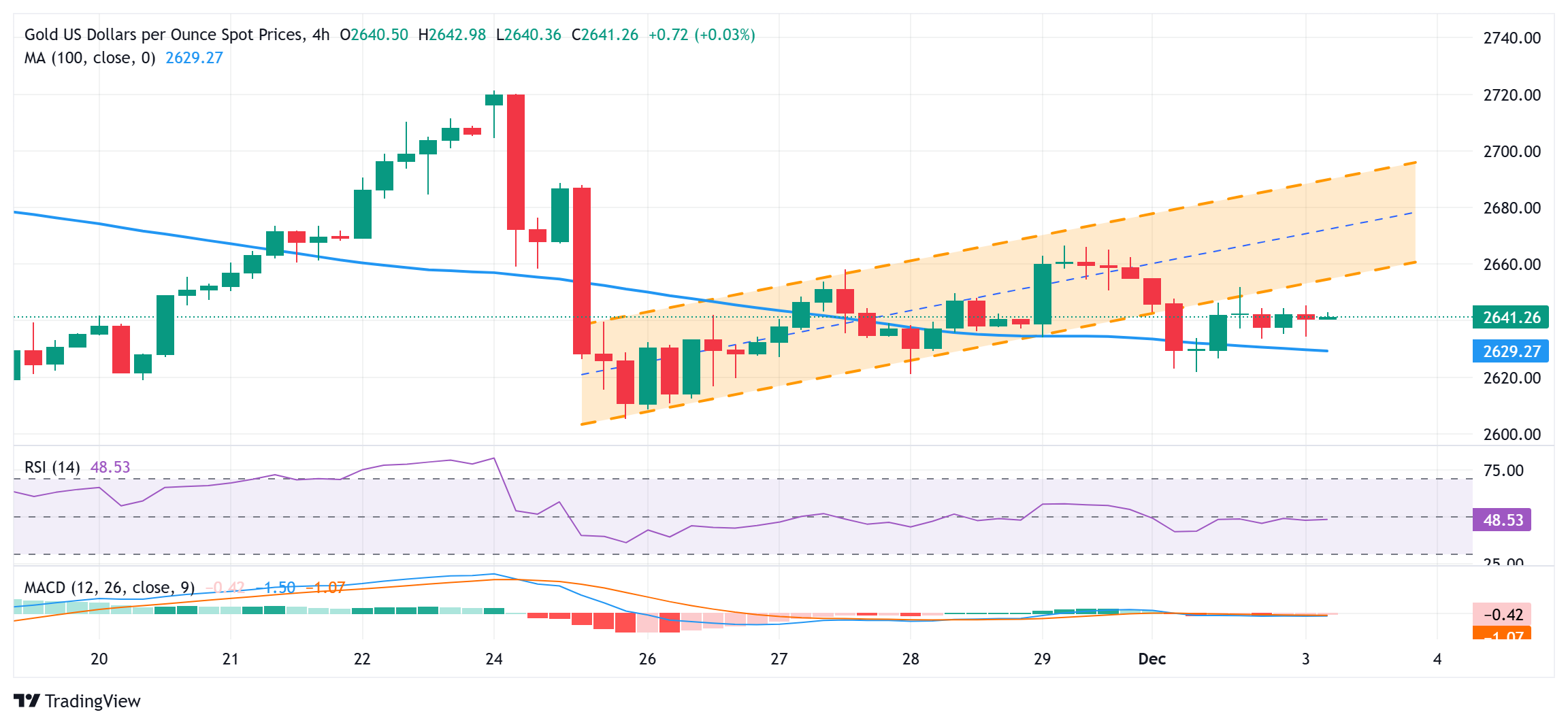
Gold price lacks a firm direction and is influenced by a combination of diverging forces.
Bets for a less dovish Fed underpin the USD and act as a headwind for the XAU/USD.
Trade war fears, geopolitical risks and depressed US bond yields lend some support.
Gold price (XAU/USD) struggles to capitalize on the previous day's rebound from the $2,620 region and oscillates in a narrow band during the Asian session on Tuesday. A firmer US Dollar (USD), bolstered by expectations for a less dovish Federal Reserve (Fed), is seen as a key factor undermining demand for the commodity. That said, concerns about US President-elect Donald Trump's tariff plans, persistent geopolitical uncertainty and suppressed US Treasury bond yields act as a tailwind for the precious metal.
Furthermore, traders seem reluctant and opt to wait for more cues about the Fed's rate-cut path before placing fresh directional bets around the non-yielding Gold price. Hence, the focus will remain on this week's important US macro data, including the closely watched US monthly employment details or the Nonfarm Payrolls (NFP) report on Friday. Apart from this, Fed Chair Jerome Powell's speech will play a key role in influencing the near-term USD price dynamics and provide a fresh impetus to the XAU/USD.
Gold price struggles to lure buyers amid a mixed fundamental backdrop
The US Dollar looks to build on the overnight recovery from a multi-month low amid bets that the Federal Reserve will keep interest rates high for a longer period and undermine the Gold price.
Investors remain concerned that US President-elect Donald Trump's tariff plans could trigger a second wave of global trade wars, which, in turn, acts as a tailwind for the safe-haven precious metal.
The Institute of Supply Management's (ISM) Manufacturing Purchasing Managers Index (PMI) rose to 48.4 in November amid hopes of business-friendly policies from the incoming Trump administration.
The CME Group's FedWatch Tool indicates a nearly 75% chance that the US central bank will lower borrowing costs by 25 basis points at its upcoming monetary policy meeting later this month.
The yield on the benchmark 10-year US government bond languishes near its lowest levels since late October and further contributes to limiting the downside for the non-yielding XAU/USD.
Russia fired at least 60 North Korean missiles against Ukraine. North Korean leader Kim Jong Un vowed that his country will invariably support Moscow until Russia achieves a great victory in Ukraine.
Investors keenly await this week's important US macro releases and Fed Chair Jerome Powell's speech, which might influence the outlook for interest rates in the US and drive the commodity.
Tuesday's US economic docket features the release of Job Openings and Labor Turnover Survey (JOLTS) Job Openings data, though the focus remains on the Nonfarm Payrolls (NFP) on Friday.
Gold price needs to surpass $2,666-2,667 hurdle for bulls to regain control
From a technical perspective, Monday's breakdown below a four-day-old ascending channel was seen as a key trigger for bearish traders. That said, mixed oscillators on daily/4-hour charts and the overnight bounce warrant some caution before positioning for a meaningful downside. Any positive move beyond the $2,650 area, however, might confront resistance near last Friday's swing high, around the $2,666 region. The next relevant hurdle is pegged near the $2,677-2,678 zone, above which the Gold price could aim to reclaim the $2,700 round figure.
On the flip side, the overnight trough, around the $2,622-2,621 area, now seems to protect the immediate downside ahead of the $2,605-2,600 region. Some follow-through selling might expose the 100-day Simple Moving Average (SMA), currently around the $2,577 zone. A convincing break below the latter should pave the way for a slide towards the November swing low, around the $2,537-2,536 region.
Gold FAQs
Gold has played a key role in human’s history as it has been widely used as a store of value and medium of exchange. Currently, apart from its shine and usage for jewelry, the precious metal is widely seen as a safe-haven asset, meaning that it is considered a good investment during turbulent times. Gold is also widely seen as a hedge against inflation and against depreciating currencies as it doesn’t rely on any specific issuer or government.
Central banks are the biggest Gold holders. In their aim to support their currencies in turbulent times, central banks tend to diversify their reserves and buy Gold to improve the perceived strength of the economy and the currency. High Gold reserves can be a source of trust for a country’s solvency. Central banks added 1,136 tonnes of Gold worth around $70 billion to their reserves in 2022, according to data from the World Gold Council. This is the highest yearly purchase since records began. Central banks from emerging economies such as China, India and Turkey are quickly increasing their Gold reserves.
Gold has an inverse correlation with the US Dollar and US Treasuries, which are both major reserve and safe-haven assets. When the Dollar depreciates, Gold tends to rise, enabling investors and central banks to diversify their assets in turbulent times. Gold is also inversely correlated with risk assets. A rally in the stock market tends to weaken Gold price, while sell-offs in riskier markets tend to favor the precious metal.
The price can move due to a wide range of factors. Geopolitical instability or fears of a deep recession can quickly make Gold price escalate due to its safe-haven status. As a yield-less asset, Gold tends to rise with lower interest rates, while higher cost of money usually weighs down on the yellow metal. Still, most moves depend on how the US Dollar (USD) behaves as the asset is priced in dollars (XAU/USD). A strong Dollar tends to keep the price of Gold controlled, whereas a weaker Dollar is likely to push Gold prices up.
* The content presented above, whether from a third party or not, is considered as general advice only. This article should not be construed as containing investment advice, investment recommendations, an offer of or solicitation for any transactions in financial instruments.



